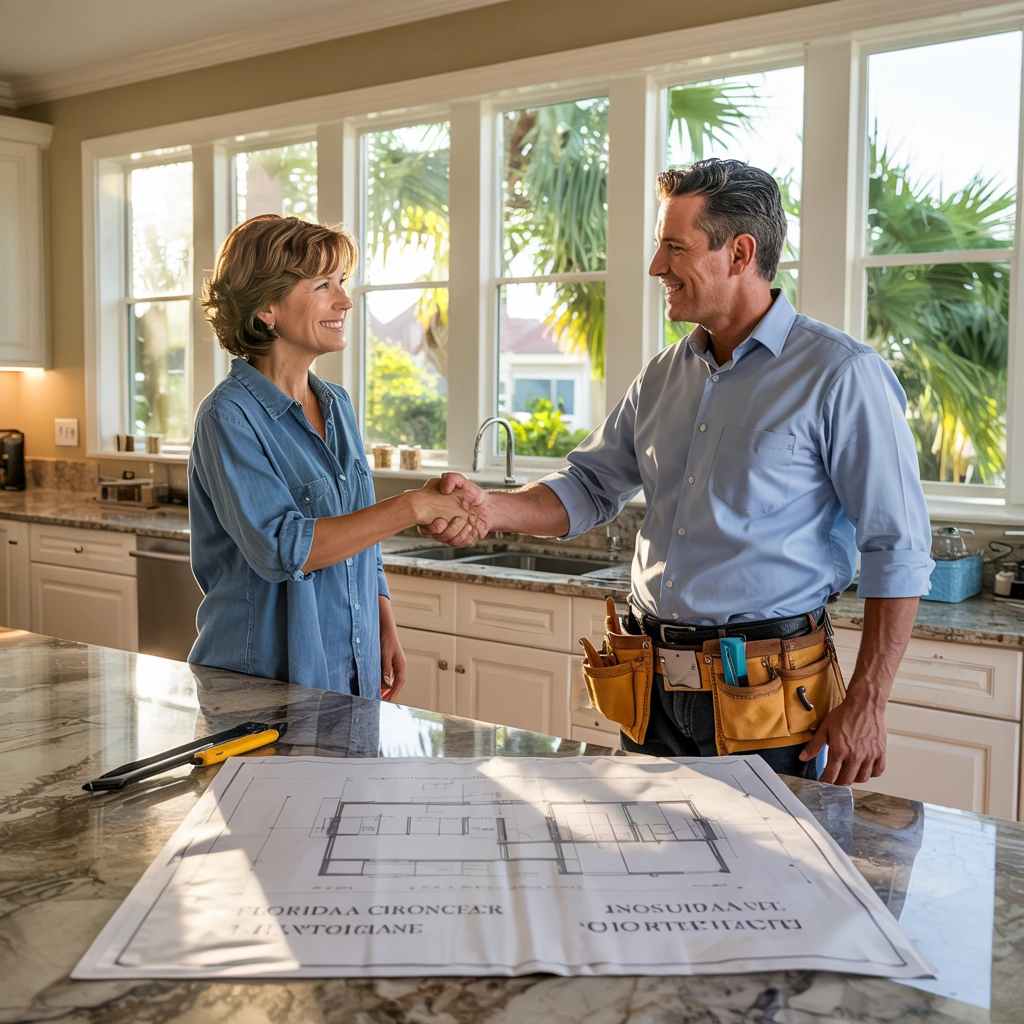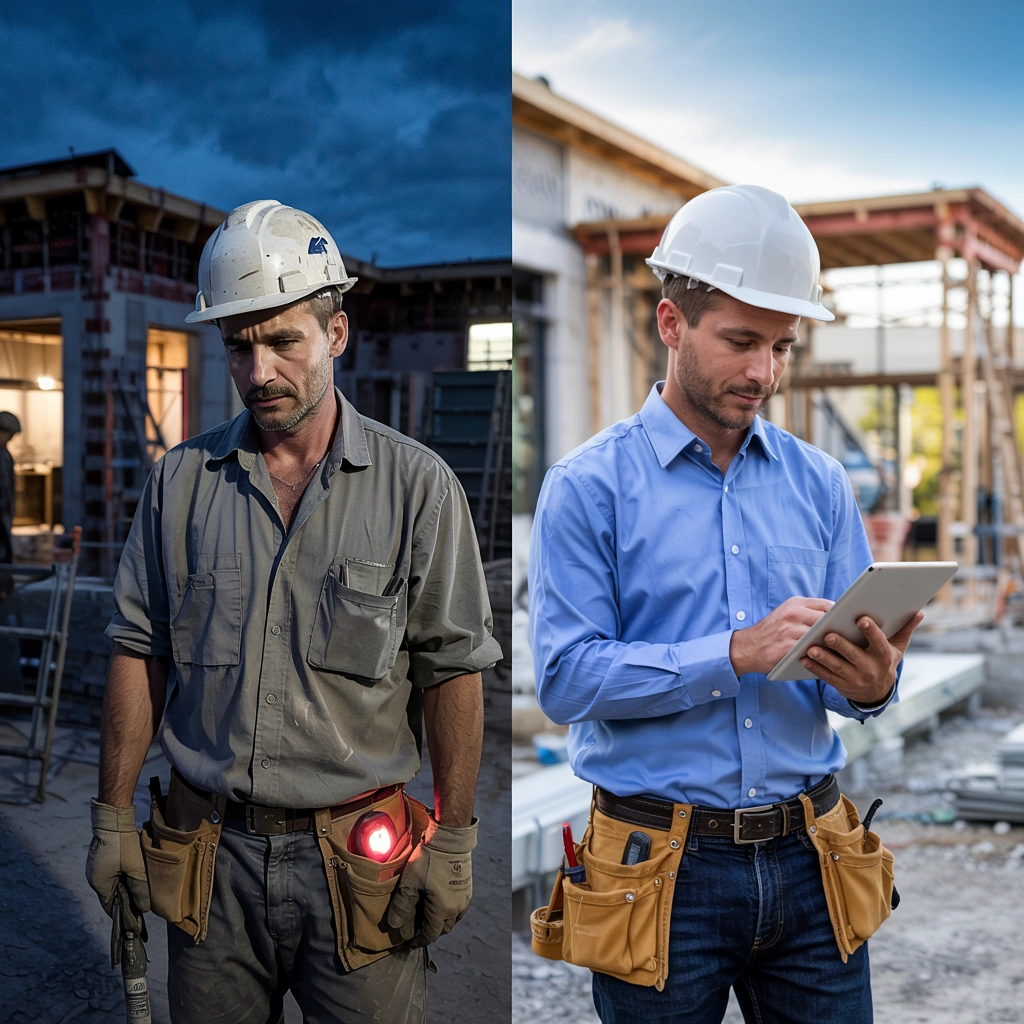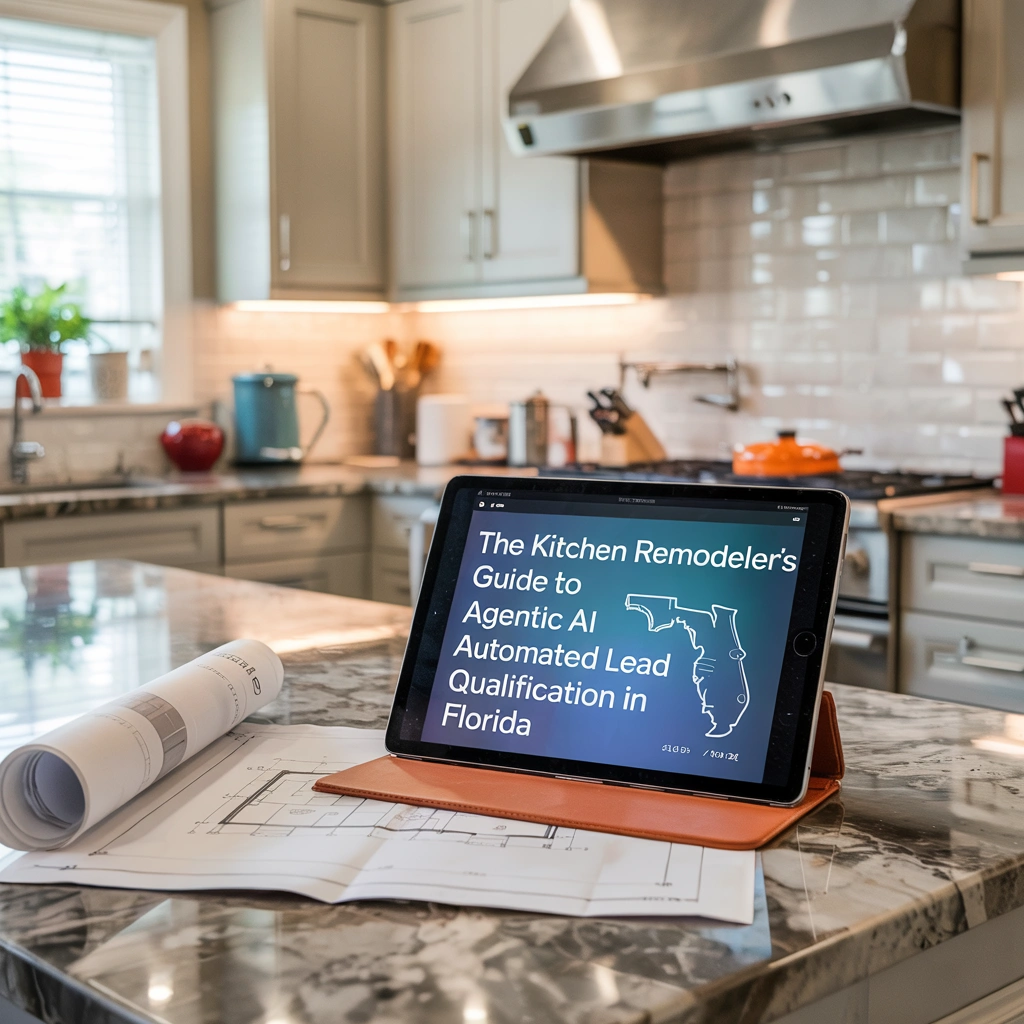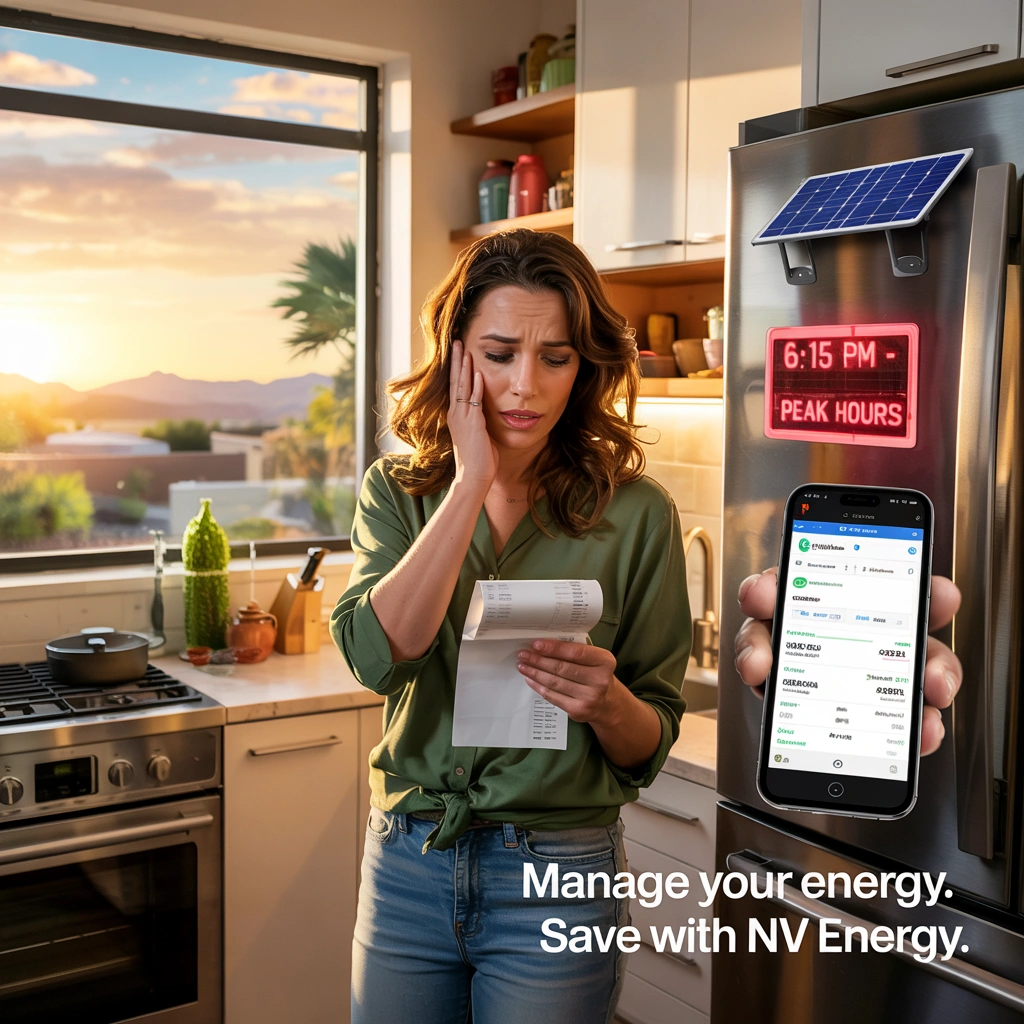
Summary: Florida kitchen remodels can turn into expensive nightmares when you choose the wrong contractor. While the state requires specific licensing and insurance protections, many homeowners don’t know the red flags that signal potential fraud or abandonment—until it’s too late.
Key Takeaways
- Verify your Florida kitchen contractor’s license and insurance requirements through official state channels to protect your investment from unqualified workers
- Watch for red flags like cash-only deposits and prices far below market rates that signal potentially untrustworthy contractors
- Florida law requires specific contract protections, including lien rights disclosure and Construction Recovery Fund advisory for projects over $2,500
- Establishing clear communication plans and documentation procedures throughout your project prevents costly misunderstandings
Your kitchen remodel represents one of the biggest home investments most Florida homeowners will make. The difference between a dream renovation and a costly nightmare often comes down to one decision: choosing the right contractor. With Florida’s unique building codes, hurricane-resistant requirements, and year-round construction seasons, finding a trustworthy professional becomes even more critical for project success.
Why Florida Homeowners Need Trustworthy Kitchen Contractors
Kitchen renovations in Florida face distinct challenges that require experienced, reliable contractors. The state’s humid climate demands proper installation techniques to prevent mold and warping. Hurricane building codes require specific structural considerations that inexperienced contractors often overlook. Without a trustworthy professional managing your project, you risk deposit loss through contractor abandonment, budget overruns from hidden charges, inferior materials that fail in Florida’s climate, and incomplete work requiring expensive corrections.
Professional contractors understand Florida’s environmental demands and protect your investment through transparent pricing and quality workmanship. They maintain proper permits, follow manufacturer guidelines, and stand behind their work with warranties. Understanding how reputable contractors market their businesses can help homeowners identify professionals who invest in proper business practices and customer relationships.
Timeline reliability becomes important when your kitchen renovation disrupts daily routines. Most homeowners set up temporary cooking spaces during construction, making extended delays both inconvenient and costly. Trusted contractors respect your time by providing realistic schedules, communicating delays immediately, and prioritizing project completion whether you’re preparing for holidays or planning to sell your home.
Verify Florida Licensing and Insurance Requirements
1. Check Contractor License Status at MyFloridaLicense.com
The Florida Department of Business and Professional Regulation oversees contractor licensing, requiring certification as a General Contractor, Building Contractor, or Residential Contractor for kitchen remodeling work. Every legitimate contractor should provide an active Florida contractor license number that matches your project scope. Visit www.myfloridalicense.com to verify license status, check expiration dates, and review complaint history. Active licenses demonstrate ongoing education and compliance with state requirements, while expired or suspended licenses indicate serious problems that could affect your project.
2. Confirm Required Insurance Coverage Amounts
Florida law mandates specific insurance coverage for kitchen remodeling contractors. General and building contractors need $300,000 public liability and $50,000 property damage coverage, while other contractors require $100,000 public liability and $25,000 property damage insurance. All contractors must carry workers’ compensation insurance to protect injured workers on your property. Request current certificates listing your address as additional insured, providing direct claim access if accidents occur during construction. Contractors without proper insurance leave you liable for injuries, accidents, and property damage.
3. Understand Florida-Specific Building Code Requirements
Florida’s building codes address unique environmental challenges that affect kitchen installations. Your contractor needs current knowledge of hurricane-resistant installation requirements, moisture control techniques for humid climates, energy efficiency standards, flood zone considerations, and proper ventilation requirements. Code violations create inspection failures, insurance claim denials, and safety hazards. Contractors unfamiliar with Florida’s specific requirements cause expensive problems discovered during home sales or insurance claims.
Red Flags That Signal Untrustworthy Contractors
1. Cash Deposits Without Proper Credentials
Florida Statute 489.126 requires contractors accepting initial payments over 10% of the contract price to apply for permits within 30 days and begin work within 90 days after all necessary permits are issued (homeowners can agree in writing to a longer period). Anyone requesting large cash deposits without proper licensing poses serious risks. Unlicensed contractors cannot pull permits legally, creating inspection failures and code violations. When contractors hesitate to show licensing, make excuses about paperwork, or demand cash payments exceeding legal limits, these behaviors indicate potential fraud or abandonment risk.
2. Prices Far Below Market Rates
Legitimate contractors have similar material and labor costs within regional markets. Dramatic underbidding often suggests planned corner-cutting, hidden fee structures, inexperienced operations, or abandonment risk after collecting deposits. Quality contractors explain their pricing clearly, showing material specifications, labor allocations, and reasonable profit margins. When someone offers a kitchen renovation for significantly less than other quotes, question where they’re cutting costs—the answer usually involves compromising your project quality or completion timeline.
3. Poor Communication and Vague Responses
Professional contractors maintain consistent communication patterns and provide clear, detailed answers. Warning signs include delayed responses suggesting overcommitment, vague explanations indicating lack of knowledge, high-pressure tactics showing desperation, avoidance of written documentation preventing accountability, and changing stories revealing dishonesty. Trust your instincts about communication quality during initial conversations—contractors who frustrate you during sales discussions won’t improve during construction when problems arise.
Contract Protections Under Florida Law
1. Mandatory Lien Rights Disclosure
Florida Statute 713.015 requires lien law disclosure on contracts over $2,500 for residential dwellings with up to four units. This disclosure must appear on the front of your contract or on a separate page signed and dated by the owner, in no less than 12-point, capitalized, boldfaced type, explaining your rights if subcontractors or suppliers aren’t paid. The disclosure protects homeowners by clearly outlining potential lien risks and legal remedies. Contractors who omit this required disclosure or bury it in fine print violate state law and demonstrate poor business practices.
2. Construction Recovery Fund Advisory
Every contract for residential property improvement over $2,500 must contain an advisory about the Florida Homeowner’s Construction Recovery Fund. Maximum recovery is $100,000 per claim for Division I contracts, with a $2,000,000 total Fund cap. This fund provides financial recourse when licensed contractors cause damage through faulty workmanship or fail to complete contracted work. The advisory must explain claim procedures and limitations, giving homeowners important financial protection information.
3. Clear Communication Plans and Change Orders
Document all contract changes with detailed descriptions, reasons, costs, and schedule impacts using written communication to create clear agreement records. Professional contractors establish communication schedules, decision-making processes, and problem-resolution procedures before starting work. Every change order should include material specifications, labor requirements, timeline adjustments, and cost implications. Never allow contractors to proceed with changes based on verbal agreements—written documentation protects both parties from misunderstandings and disputes.
Building Strong Communication Throughout Your Project
1. Establish Regular Update Schedules
Consistent progress updates prevent anxiety and help homeowners plan around construction activities. Before starting, establish your preferred communication method—some homeowners want daily text summaries, while others prefer weekly meetings or photo updates. Professional contractors adapt to your communication style while maintaining regular contact about progress, problems, and schedule changes. Photo documentation helps track advancement when you can’t visit the site and catches issues early before they become expensive problems.
2. Document All Decisions and Changes
Every remodel encounters unexpected issues like water damage behind walls, structural surprises, or material delays. Trusted contractors handle problems professionally with immediate notification, clear explanation of options, documented cost implications, and your approval before proceeding. Maintain written records of all decisions, changes, and problem resolutions. This documentation prevents small issues from becoming major problems and protects your interests if disputes arise during or after construction.
Protecting Your Investment Through Proper Contractor Selection
Building trust with your Florida kitchen remodeling contractor requires thorough verification, clear communication, and documented agreements. Start your search early, allowing time for proper evaluation rather than making rushed decisions that often lead to poor outcomes. Verify current licensing and insurance, check references from similar projects, and evaluate communication quality during initial consultations. Trust your instincts when something feels wrong—the right contractor relationship makes your renovation experience positive and rewarding.
Professional contractors demonstrate their commitment through proper licensing, insurance coverage, transparent pricing, and clear communication. They understand Florida’s unique building requirements, maintain supplier relationships, and stand behind their work with written warranties. Quality contractors also evaluate potential clients, seeking homeowners who communicate clearly, make timely decisions, and respect the construction process. This mutual selection creates better outcomes for everyone involved.
Your dream kitchen awaits with the right professional partnership. Take time to verify credentials, understand contract protections, and establish clear communication expectations. The effort invested in building trust today prevents expensive problems tomorrow, ensuring your kitchen renovation improves your home and lifestyle for years to come. For expert guidance on connecting with trusted renovation professionals, visit Contractor in kitchen remodeling, where they help homeowners find reliable contractors through proven marketing insights.
Frequently Asked Questions
How Kitchen Remodeling Companies Can Leverage This Content
This informative article, “Building Trust with Your Florida Kitchen Remodeling Contractor” can be adapted and repurposed across multiple marketing formats to help increase website traffic for kitchen remodeling services, build trust with potential clients, and differentiate their services in a competitive market. We help with How Content Marketing Can Set Your Kitchen Remodeling Business Apart by transforming technical content into powerful marketing campaigns across all digital channels, ensuring maximum reach and engagement with potential customers.







